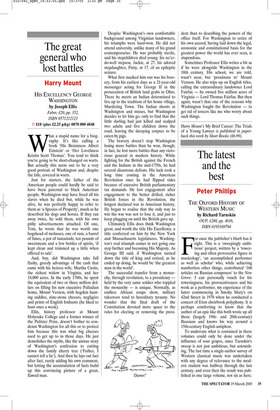The great general who lost battles
Harry Mount
HIS EXCELLENCY GEORGE WASHINGTON by Joseph Ellis Faber, £20, pp. 352, ISBN 0571212123 ✆ £18 (plus £2.25 p&p) 0870 800 4848 What a stupid name for a biography. It’s like calling a book ‘His Braininess Albert Einstein’ or ‘Her Loveliness Kristin Scott Thomas’. You tend to think you’re going to be short-changed on warts. But actually this turns out to be a very good portrait of Washington and, despite the title, covered in warts.
Just for starters, the father of the American people could hardly be said to have been paternal to black American people. Washington may have freed all his slaves when he died but, while he was alive, he was perfectly happy to refer to them as ‘a Species of Property’, much as he described his dogs and horses. If they ran away twice, he sold them, with his own pithy advertisements attached. Of one, Tom, he wrote that he was worth one hogshead of molasses, one of rum, a barrel of limes, a pot of tamarinds, ten pounds of sweetmeats and a few bottles of spirits, ‘if kept clean and trimmed up a little when offered to sale’.
And, boy, did Washington take full flashy, greedy advantage of the cash that came with his heiress wife, Martha Custis, the richest widow in Virginia, and her 18,000 acres. In the early 1760s, he spent the equivalent of two or three million dollars on filling his new executive Palladian home, Mount Vernon, with hogskin hunting saddles, nine-stone cheeses, negligées and prints of English foxhunts (he liked to hunt once a week).
Ellis, history professor at Mount Holyoake College and a former winner of the Pulitzer Prize, doesn’t bother to condemn Washington for all this or to protect him because this was what big cheeses used to get up to in those days. He just demolishes the myths, like the untrue story of Washington’s confession to cutting down the family cherry tree (‘Father, I cannot tell a lie’). And then he lays out fact after fact, rarely adding his own comment, but letting the accumulation of facts build up this convincing picture of a great, flawed man. Despite Washington’s own comfortable background among Virginian landowners, his triumphs were hard-won. He did not attend university, unlike many of his grand contemporaries. He was probably sterile, and his stepchildren died young: his ne’erdo-well stepson, Jackie, at 27, his adored stepdaughter, Patsy, at 17, of an epileptic seizure.
What first marked him out was his bravery, from his earliest days as a 21-year-old messenger acting for George II in the prosecution of British land grabs in Ohio. There he meets an Indian determined to live up to the tradition of his home village, Murdering Town. The Indian shoots at Washington and misses, but Washington decides to let him go, only to find that the little darling had just killed and scalped two adults and five children down the road, leaving the decaying corpses to be eaten by pigs.
The bravery doesn’t stop Washington losing more battles than he won, though; in fact, he lost more battles than any victorious general in modern history. While fighting for the British against the French and the Indians in the mid-1750s, he had several disastrous defeats. His luck took a long time coming in the American Revolution once he had flipped sides because of excessive British parliamentary tax demands. He lost engagement after engagement to the better drilled, richer British forces in the Revolution, the longest declared war in American history. He began to realise that the only way to win the war was not to lose it, and just to keep plugging on until the British gave up.
Ultimately Ellis does think Washington great, and worth the title His Excellency, a title conferred on him by the New York and Massachusetts legislatures. Washington’s real triumph comes in not going one step further and becoming His Majesty. As George III said, if Washington turned down the title of king and retired, as he ended up doing, he would be ‘the greatest man in the world’.
The successful transfer from a monarchy, through revolution, to a presidency held by the very same soldier who toppled the monarchy — is unique. Normally, as endless African coups show, military takeovers tend to hereditary tyranny. No wonder that the final draft of the Constitution devoted more space to the rules for electing or removing the presi dent than to describing the powers of the office itself. For Washington to retire of his own accord, having laid down the legal, economic and constitutional basis for the greatest power the world has ever seen, is stupendous.
Sometimes Professor Ellis writes a bit as if he were alongside Washington in the 18th century. His school, we are told, wasn’t near, but ‘proximate to’ Mount Vernon. He also trips up on English titles, calling the extraordinary landowner Lord Fairfax — he owned five million acres of Virginia — Lord Thomas Fairfax. But then again, wasn’t that one of the reasons why Washington fought the Revolution — to get rid of tossers like me who worry about such things.
















































 Previous page
Previous page